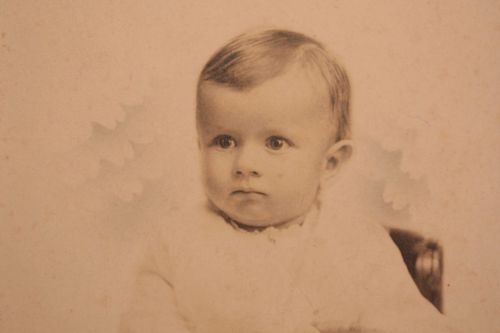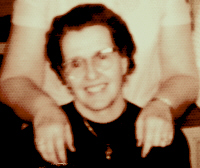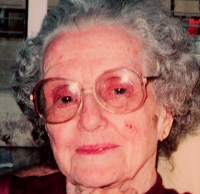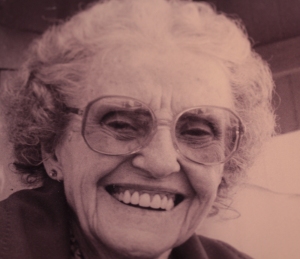By Marylin Schultz

My Father In Front Of The Family Ford — Earl Russell Biggs II, vintage family postcard, circa early 1900’s, photo scan © 2011 by Marylin Schultz. All rights reserved.
Images from long ago—letters, photographs, postcards, communicate family history, like ribbons tying up bundles of memories. I look into the sweet innocence of children’s faces and reflect on what I do know of their lives. Little Earl Russell Biggs, II, my father, placed in front of his family’s first automobile by a proud papa. There would eventually be four generations of men in the family, given that name. Family tradition had each generation alternating the names they were “known as.” My grandfather was called Earl, my father went by Russell. My brother was called Earl and his son was known as Russ, or the nick-name,” Rusty.”
The baby, Frances Louise Oliver, my mother, was as fair in complexion as E. Russell was dark. Their childhoods would also be in stark contrast. He was born in 1910, and she was three years younger. Frances was the adored, pampered baby of her family, with three brothers and a sister, much older than she. Frances always got what she wanted, I’m told, and became a woman who maintained that expectation from life.

My Mother — Frances Louise Oliver, family photo scan
© 2011 by Marylin Schultz. All rights reserved.
Russell’s life probably began happily enough. His father and mother, Mary Dickens Biggs, lived in Childress, Texas, where he was a successful businessman in banking, and insurance, as well as owning a cattle ranch, where the family lived. Russell was big brother to Emma Ruth, five years younger than he was. In 1920, tragedy struck the young family. Mary Dickens Biggs, who was expecting their third child, died from the dreaded Influenza that took over 20 million lives in Europe and America.
The parents of E. R. Biggs, Sr. were no longer living, and Mary’s parents offered to care for the children, so the devastated father agreed. Russell and Emmy spent the next two years with the Dickens family, who were living on the Red Lake Reservation in Minnesota, where Felix Dickens, Mary’s brother, was the BIA Agent.
E. R. Biggs married his second wife, Lillian, and the two children were moved back to their Texas home. Very soon, however, Russell, at the age of twelve, was sent off to a Military Academy, and spent the rest of his school years there, only home for the summers and holidays. E.R. and Lillian had another son and daughter. It was one of those cases of a step-mother, whose “own” children could do no wrong, and the older children felt deeply, the deprivation of approval and affection. Emma, while still a teenager, had a baby, who was immediately placed for adoption, never experiencing even one embrace of the young mother who so desperately wanted to love and be loved.

(L to R) Paul, Harriet, Eloise, Mildred, & Grace Dickens, Russell Biggs (My Father) on right, Seger Indian School, Colony, Oklahoma, March 17th, 1912, vintage family postcard, photo scan © 2011 by Marylin Schultz. All rights reserved.
I always wondered what it must have been like to grow up on Indian reservations, which the five Dickens children experienced. As we know from the postcard, they were in Oklahoma, then Minnesota and later in Washington State. As a child, I remember my father’s Uncle Felix visiting us a few times at our home in California. I have a few letters that he wrote to my Aunt Emma, which were from a reservation in South Dakota. These were at a much later date, when Emma was an adult.

Side B: Back of the Postcard of Seger Indian School, Colony, Oklahoma, March 17th, 1912, vintage family postcard, photo scan © 2011 by Marylin Schultz. All rights reserved.
I finally met some of my Dickens relatives in an unusual way. After the deaths of my mother and father, I received all the family documents. In going through the papers I learned that Mary Dickens was born in McGregor, Iowa. My husband and I were scheduled to drive from our home in Bismarck, No. Dakota to La Crosse, Wisconsin, for a convention, the very next day. I looked at a map and saw that McGregor was only a few miles south, and across the Mississippi River from Prairie du Chien. I decided to see if I could find a trace of the Dickens family in the small, riverside town of McGregor.
It was a cold, gray November Saturday. The trees along the river were bare, but the drive along the river was peaceful and I was feeling hopeful. When I entered the town, I saw a building marked “Museum,” and I parked. The sign on the Museum door said something like “Closed. See you next Spring.” The only place open was the Hardware Store, so I went in. The woman behind the counter gave me a warm welcome. I told her of my quest for family members and asked if she knew of any Dickens who were still living in the area.
“Harvey Dickens lives about five miles west of town,” she replied. “Would you like to call him from here?” I answered in the affirmative just as the phone rang. She spoke to the person for a few minutes, and then I heard her say, “There’s someone here who wants to speak to you,” and handing the phone to me, with a big smile, she said, “It’s Harvey Dickens.” I gasped in amazement at the coincidence, and took the phone. I gave a very brief explanation of who I was. He invited me to come to his home, and I scribbled down the directions he gave, handed the phone back to the woman and thanked her. She smiled and wished me good luck, and I hurried to my car.
Harvey had given good directions to his farm, and I found it with no problem. The plain, two story home, painted a soft yellow, with dark green shutters at the windows, was well cared for. There was a row of pine trees to the west of the house, offering a buffer from the prevailing prairie winds, and a hedge of Lilac bushes between house and out-buildings. The tires of my car made a crunching sound on the neatly graveled driveway. Harvey opened the door of the house before I started up the steps. His smile was wide.
“Come on in, little lady, it’s cold out there!” He introduced me to his wife, Louise, and immediately I felt the genuine warmth of their welcome. They already had a box of old papers and photographs for me to look at. Harvey was a slightly built man, about 70 years old. Louise, looking comfortable in sweater and jeans, offered me coffee, as we sat down around the kitchen table.
“We have four children, but they’ve all moved away,” Louise said, filling my cup.
With a sigh, Harvey added, “Not much to keep them in a small town in Iowa, and none of ‘em was interested in farming.” Harvey took photos out of the box, pointing out each individual by name. “Better write down those names on the back,” Louise gently chided. “No one but you can identify them anymore.” I listened carefully, not recognizing any names until he said, “And this is Uncle Felix.”
“Yes,” I said, now excited, as he handed it to me. “Did he have three daughters, who lived in Washington?” He smiled broadly, and replied, giving me their names. We had made a connection, as it turned out that his grandfather was my great-grandfather. We looked at more photographs and he gave me the names and addresses of other cousins that had done more research into the family history.
We were engrossed in each others’ family anecdotes, laughing at the funny little quirks that all families have, and the morning flew quickly by. I turned down an offer of a noon meal, and told them I needed to get back to La Crosse.
“Now, if you can come back, I’ll take you to the cemetery; quite a few Dickens there,” Harvey said.
“You keep in touch,” Louise whispered in my ear, as we exchanged a hug.
“I promise I will, and thank you so much. It was a great pleasure to meet you. I feel like I’ve been with old friends,” I replied.
“Nope, better than friends, we’re family!” Those were Harvey’s last words to me as I got into my car. That brief visit opened up a whole new chapter in my family history, and as I drove across the bridge over the wide Mississippi, I felt truly blessed.
Editor’s Note: In the late 19th and early 20th centuries, professional photographers offered customers the choice of placing photographs on postcards, like the “packages” they sell today. Some were taken in a studio and others at different locations. The photo of Frances was taken in a studio, and the other two at the homes of their clients. Images From The Past was partly inspired by conversation on the postcard piece Joshua Trees & Desert Sands — Jan 25 1947.
_________________________
About Marylin: Marylin (aka oliverowl) is a freelance writer living in Wyoming. She has written essays for a weekly column in the Ventura Star Tribune and collaborated with her grandson on two picture books for children. She currently writes with the Cody Writers. Her previous pieces for red Ravine include the travel essay Rollin’ Easy and a Writing Practice, Kindness.
In 2010, Marylin was published in the book, From the Heart — Writing in the Shadow of the Mountain, a collection of work from members of Write On Wyoming (WOW), a group of authors and aspiring writers living in northeastern Wyoming. Her contributions to From the Heart include two works of fiction, To Love Bertie Lou and The Appointment Book, and a collection of haiku, Seasons in Wyoming.
Read Full Post »










































